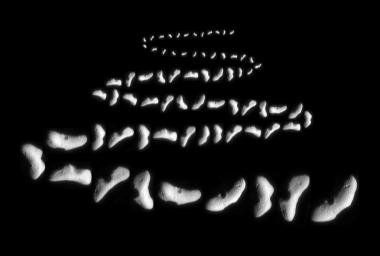
|
NEAR Road to Eros
- Click the image above for a larger view
- Full-Res JPEG (1024 x 691) (34.5 kB)
- Full-Res TIFF (1024 x 691) (189.6 kB)
Caption:
This montage shows a selection of images of the asteroid 433 Eros that were acquired from the NEAR spacecraft over three weeks from January 22 through February 12, 2000, as the spacecraft's distance from its target shrank from 18,000 to 1260 miles (29,000 to 2025 km). As the spacecraft closed in on its target, the resolution of the images increased from 1.7 to 0.12 miles (2.8 to 0.19 km) per pixel. At 20x8x8 miles in size (33x13x13 kilometers), Eros is the second largest near-Earth asteroid and spins on its axis once every 5 hours, 16 minutes.
During the early stages of NEAR's approach, Eros appeared as a small blob only a few pixels across. The apparent size of Eros and the resolution of the pictures increased continuously, at first only slowly and later dramatically day by day until, on February 9, the level of detail visible exceeded that during NEAR's first flyby of Eros on December 23, 1998. In the last images shown here, details of Eros's surface have become visible. Heavy cratering has pockmarked the irregular asteroid's surface. One side is dominated by a scallop-rimmed gouge, and the opposite side by a conspicuous, raised-rimmed crater.
Background Info:
Built and managed by The Johns Hopkins University Applied Physics Laboratory, Laurel, Maryland, NEAR was the first spacecraft launched in NASA's Discovery Program of low-cost, small-scale planetary missions. See the NEAR web page at http://near.jhuapl.edu/ for more details.
Cataloging Keywords:
| Name | Value | Additional Values |
|---|---|---|
| Target | 433 Eros | |
| System | Near Earth Objects | |
| Target Type | Asteroid | |
| Mission | NEAR Shoemaker | |
| Instrument Host | NEAR Shoemaker | |
| Host Type | Orbiter | |
| Instrument | Multi-Spectral Imager (MSI) | |
| Detector | ||
| Extra Keywords | Crater, Grayscale, Rotation | |
| Acquisition Date | ||
| Release Date | 2000-05-07 | |
| Date in Caption | 1998-12-23 | 2000-02-12 |
| Image Credit | NASA/JPL/JHUAPL | |
| Source | photojournal.jpl.nasa.gov/catalog/PIA02462 | |
| Identifier | PIA02462 | |
